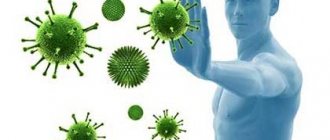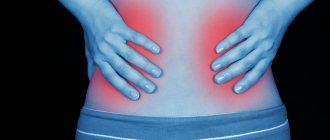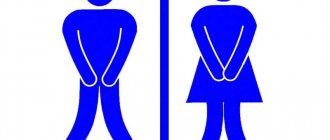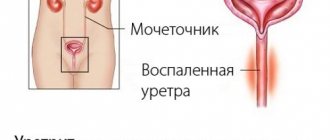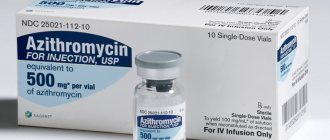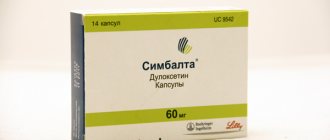The inflammatory process in the bladder is called cystitis and occurs more often in females. This is explained by the anatomical features of the structure of the urinary tract, where the urethra in women is shorter and wider than in men. There can be many causes of inflammation, and depending on them, different medications will be prescribed. Cystitis cannot be left unattended, as it can cause serious complications and cause severe discomfort to the patient.
What is cystitis?
Cystitis is a painful and unpleasant disease, considered more typical for women than for men, and this is due to the peculiarities of the anatomical structure of the female genital organs. Proximity to the intestines, unprotected urethra, and a wide and short urethra often become causes for ascending infections. Other reasons may influence the development of cystitis:
- ascending route of infection of the urinary tract and bladder - from below, along the urethra;
- descending path - the cause of infection is bacterial infections of the kidneys;
- lymphogenous and hematogenous methods of penetration of bacteria that cause cystitis, respectively, with lymph and blood from other organs and tissues in which there is a focus of acute bacterial inflammation.
Inflammatory processes in the mucous membranes of the bladder are accompanied by frequent urge to go to the toilet, pain and burning when urinating, and pain in the lower abdomen. Sometimes the disease is accompanied by fever.
The disease is characterized by acute and chronic forms, the second option often becomes a consequence of an untreated acute process. Chronic cystitis can be aggravated by the slightest hypothermia, decreased immunity, colds, and for many other reasons.
Additional treatment recommendations
Pain during cystitis is often very difficult to endure. Before the medications begin to take effect, the woman will have to do something to minimize trauma to the mucous membrane and maximize recovery. To do this, you need to follow these recommendations:
- Drink as much water as possible. Despite the pain when urinating, you need to go to the toilet as often as possible so that pathogenic microorganisms are naturally eliminated from the urinary tract and do not have time to stagnate and multiply.
- Do not forget about daily personal hygiene, as this fact is especially important for girls.
- In case of frequent relapses, it is recommended to undergo tests to identify pathogenic microflora, which remains active in a chronic form, and to undergo longer treatment.
- It is necessary to regularly visit a gynecologist for preventive examinations and timely detection of sexually transmitted infections.
- If you are predisposed to exacerbation of cystitis, it is recommended to periodically take prophylactic agents of plant origin, among which are infusions of bearberry, lingonberry, cranberry, as well as the drug Canephron.
- During an exacerbation, a diet excluding spicy, salty and mucosal irritating foods is recommended.
- Try to go to the toilet more often so that urine does not accumulate in the bladder and pathogenic microflora cannot develop in it.
Symptoms
Cystitis is different from other diseases of the genitourinary system, so the acute form is quite easy to diagnose.
Main symptoms in women:
- as a rule, cystitis begins with a frequent urge to urinate, initially painless, later with pain, burning, and unpleasant sensations;
- during the process of urination, pain is characteristic at the beginning and end of the process;
- the process develops quickly, over several hours, often accompanied by chills characteristic of low-grade fever;
- with the development of inflammation, pain and pain during urination become unbearable;
- the urine becomes cloudy due to the admixture of pus. If the process affects the kidneys, blood may appear in the urine;
- vague symptoms of cystitis can lead to exacerbation of chronic kidney diseases and increased temperature;
The chronic form is characterized by non-obvious symptoms, often unnoticeable, even without changes in urine. Loosening of the mucous membrane and signs of an inflammatory process can only be detected using hardware techniques (ultrasound) and cystoscopy, but with the slightest hypothermia, chronic cystitis relapses and can cause severe kidney pathologies.
Diagnosis of bladder inflammation
To establish the exact cause of the disease, doctors prescribe the following studies:
- cystoscopy, urethroscopy;
- bacteriological culture;
- general blood and urine analysis;
- Ultrasound of the kidneys and bladder.
Women are prohibited from donating biological material during menstruation, since blood that gets into a container with urine interferes with the accuracy of the results, which is why incorrect treatment is prescribed.
For the results of laboratory tests to be correct, you need to:
- wash yourself before collecting;
- Place urine only in a sterile container.
Causes
Cystitis is a concomitant disease with sexually transmitted infections, candidiasis, tuberculosis, and vaginal dysbiosis. It can be a consequence of various surgical procedures, accompanied by traumatic damage to the mucous membranes, with various endocrinopathies and hormonal changes in the woman’s body. The bacterial causative agents of the process in more than 80% of cases are Escherichia coli, staphylococcus, Klebsiella, Pseudomonas aeruginosa, and others.
The main causes of bladder inflammation in women:
- hormonal changes in the body during pregnancy or age-related changes;
- taking contraceptives, food allergies;
- changes in the vaginal microflora, dysbacteriosis, which are accompanied by active growth and reproduction of pathogenic microflora;
- acute and chronic kidney diseases;
- various endocrinopathies, in particular diabetes mellitus of any origin;
- inflammatory diseases of the female reproductive system;
- sexual infections;
- intoxication as a result of acute or chronic infection, drug or radiation therapy;
- hypothermia, colds, nervous stress, decreased immunity;
- any manipulations and surgical interventions.
It is very important to determine the causative agent of the inflammatory process, this will allow you to choose the right medicine for cystitis. To prevent the occurrence of a chronic process, it is necessary to eliminate the causes of inflammation.
Doctor's tactics for cystitis
With an abundance of antibiotic tablets, the doctor’s actions are limited:
- the inability to quickly identify pathogenic flora in urine; it will take 2-3 days after the test until the pathogen becomes known in the result obtained (when the sediment is stained);
- the practical absence of information about the resistance of the identified flora (tests are carried out only in bacteriological laboratories, which are not available in clinics);
- unreliable information about the viral etiology of the disease, since viruses are not detected with conventional staining.
To prevent delays in treatment, doctors prescribe medications with a broad spectrum of action in the hope that a specific pathogen will theoretically fall into this group. Information about resistance periodically appears in guidelines, so the most effective drug can be prescribed.
In the future, if there are no signs of effectiveness:
- medications have to be changed, taking into account the manifestation of flora resistance;
- prescribe combinations of tablets and suppositories;
- carry out local procedures for washing the bladder with antiseptics.
If we take into account that the patient did not come to the doctor on the first day of symptoms, it turns out that therapy is significantly delayed and there is a serious threat of inflammation becoming chronic.
Diagnostics
The following methods are used to diagnose cystitis:
- it is necessary to pass a general urine test, and according to Nechiporenko;
- do an ultrasound of the bladder;
- cystoscopy;
- vaginal smear.
Depending on the test results, appropriate treatment for cystitis and related diseases is prescribed. At this time, it is necessary to adhere to a diet that is based on the complete exclusion of irritating foods: spicy, salty, smoked, sour, alcohol.
Medicines to treat the disease
To treat an acute process, as a rule, an effective remedy for cystitis is prescribed - antibiotics - to suppress the active reproduction and metabolism of pathogenic bacteria that cause the inflammatory process.
In combination with this medicine for cystitis in women, to eliminate symptoms, other drugs are used that normalize the microflora and have antiviral, antifungal, antispasmodic and anti-inflammatory effects:
- antibiotics: Amoxicillin, Augmentin, Ampiox (penicillin), Cefazolin (cephalosporin), Quintor, Sparflo (fluoroquinolone), bactericidal drug Monural (phosphonic acid derivative), bactericidal and bacteriostatic drug Furadonin (nitrofuran);
- antispasmodics for cystitis: Drotaverine, No-shpa;
- antiviral: Viferon, Capiferon, Kagocel, Amiksin;
- suppressing the development and metabolism of fungi: Ketoconazole, Fluconazole;
- anti-inflammatory non-steroidal drugs for cystitis: Nimesulide, Nimesil, Diclofenac;
- synbiotics, probiotics and prebiotics restoring microflora;
- plant-based anti-inflammatory drugs: Canephron, Cyston, Phytolysin, Monurel.
Cystitis should be treated after consultation with a doctor; he will help you choose the most effective means to eliminate the problem.
What means provide pain relief?
Patients are often interested in the question of what pills can be taken for cystitis with severe pain. Painful dysuric manifestations require good analgesic treatment. Sometimes it is necessary to prescribe ampoule preparations for faster and more effective results.
The most common group of antispasmodics. These are drugs that act directly on the detrusor muscle and sphincter of the bladder or block the transmission of the nerve pain impulse to the spinal cord. By reducing spastic contraction, pain is eliminated, and the urge to urinate becomes less frequent.
It is most convenient to use tablets of isoquinoline drugs. Representatives - Drotaverin, No-shpa. We should not forget that these remedies do not treat inflammation, but are symptomatic and alleviate the manifestations of cystitis.
After taking the pill, the spasm is relieved within an hour. Negative effects on the nervous system are mild.
Top rated
For treatment, doctors usually recommend relatively inexpensive and effective tablets for cystitis in women; they will help relieve acute inflammation:
- Palin is a bactericidal and bacteriostatic antibiotic that effectively suppresses the reproduction and metabolism of pathogenic microflora that causes inflammation of the mucous membranes of the urinary tract. Palin quickly eliminates inflammation, normalizes the condition, and relieves the main symptoms of the disease. Prescribed in a course of up to 2 weeks, 400 mg per day;
- Furadonin is an inexpensive and effective remedy; it can quickly cure cystitis in women; the tablets relieve the main unpleasant symptoms and eliminate signs of inflammation. Effective for the treatment and prevention of chronic process caused by gram-negative and gram-positive bacteria. The appointment is made depending on the severity of the process. Furadonin and similar drugs should be taken with plenty of water, otherwise the drugs may cause drug intoxication;
- Monural is a bacteriostatic and bactericidal drug with a broad spectrum of action, which significantly improves the condition of acute inflammation the very next day after the start of use. For cystitis, an effective medicine is prescribed for a course of up to 7 days;
- Amoxicillin - even pregnant women can be treated because this inexpensive and effective antibiotic is relatively safe. When it is used, the symptoms of cystitis disappear in a short time, but E. coli shows a certain resistance to it. Side effects may occur in the form of individual intolerance to the components or the development of dysbacteriosis after long-term use.
The bacterial flora that causes cystitis may become insensitive to certain drugs over time, so after a course prescribed by a doctor, a urine culture must be done. After the analysis, the doctor may prescribe other antibiotics or preventive measures to prevent the development of a chronic process. Due to the large number of side effects, Biseptol, a very popular sulfonamide drug at one time, almost ceased to be used.
Herbal remedies
What tablets for cystitis, besides antibiotics, do doctors recommend? Bactericidal and anti-inflammatory herbal medicines are widely used in combination with antibiotics.
To eliminate symptoms, the doctor may prescribe treatment for cystitis in women with the following herbal ingredients:
- Cyston is an anti-inflammatory, antibacterial and diuretic, which contains a large number of active plant ingredients. Cystone is prescribed to be taken over a long course, during which it not only eliminates the symptoms of cystitis, but also helps dissolve sand and stones in the kidneys;
- Urolesan in capsules or tablets, an anti-inflammatory and bactericidal agent based on extracts of several active plant components. Urolesan is very effective with long-term use; it is prescribed for the prevention of a chronic process;
- Monurel is based on cranberry extracts, which has a bactericidal effect against Staphylococcus aureus and other bacterial flora. Monurel quickly relieves inflammation, increases the effectiveness of antibiotic therapy, restores immunity, prevents relapses and chronicity of the process (read the article on the treatment of cystitis with cranberries);
- Canephron is an antimicrobial remedy for cystitis in women, based on a combination of plant substances. Canephron is effective in combination with antibiotics, and is also prescribed to be taken for the prevention of disease, it effectively eliminates cramps and pain when urinating, quickly suppresses the development and metabolism of pathogenic microflora;
- Phytolysin is a preparation in the form of a paste, it contains active antimicrobial and anti-inflammatory ingredients. With long-term use, Phytolysin helps to normalize urination, in combination with antibiotics, eliminates the symptoms of acute cystitis, and helps to avoid further relapses. It is prescribed to be taken to prevent the formation of kidney stones;
Composition of phytolysin
In addition, decoctions of herbs such as bearberry, pol-pal, lingonberry leaves and others are widely used. They are used in combination with antibiotic therapy to treat and prevent relapses of cystitis.
Candles
How to treat cystitis in women, besides pills? The complex recommends dosage forms in the form of suppositories with active ingredients that effectively relieve unpleasant symptoms. Vaginal suppositories contain components that help get rid of not only bacterial flora, but also protozoa and viruses:
- Hexicon contains components that are effective against bacteria and protozoa that complicate the inflammatory process. Suppositories quickly relieve the feeling of stinging, burning and pain during urination due to cystitis. The standard course is 2 suppositories per day, designed for a week, but for prevention, use for 2 to 3 days is sufficient;
- Viferon contains components that have antiviral and immunomodulatory effects; it is prescribed to achieve a quick effect in complex treatment with antibiotics and other bactericidal drugs. Suppositories relieve discomfort when urinating, but are used only with other medications.
For infections of the genitourinary system, many of which are sexually transmitted, other medications for cystitis are prescribed, for example, the antiparasitic and antimicrobial drugs Trichopolum or Metronidazole. They effectively suppress the reproduction and development of many simple microorganisms, aerobic and anaerobic bacteria, and with their help you can quickly neutralize secondary genitourinary infections, many of which lead to the development of chronic inflammatory processes.
Other medicines
What to take as painkillers for cystitis in women, if the pain and cramps are unbearable? It is recommended to take the following antispasmodics:
- No-spa, an anesthetic drug that relaxes smooth muscles. Effectively and quickly relieves discomfort from cystitis, it can be used in tablets or injections, the maximum daily dose for adults is 240 mg;
- Drotaverine is prescribed for colic of any origin; it effectively relieves spasm of smooth muscles. The maximum daily dose for adults is 120 mg. The drug is prescribed with caution to hypotensive patients, since one of the side effects may be a slight decrease in blood pressure.
When the use of other antispasmodics does not bring the desired effect, the doctor may recommend Nurofen, Ketorol or Diclofenac to relieve severe pain.
To eliminate the symptoms of dysbiosis, the following list of probiotics, prebiotics or synbiotics is prescribed:
- Hilak forte;
- Dufalak;
- Linux;
- Lactiale.
Douching with the drug Bifidumbacterin will help quickly restore the vaginal microflora. To restore immunity and improve general condition, it is usually prescribed to take a multivitamin complex, for example, Supradin.
Treatment of cystitis should take place against the background of dietary nutrition, with the abolition of alcohol, spicy, salty, sour, and any food that will irritate the bladder mucosa.
Tablets for the rapid treatment of cystitis in women
Drugs for effective and rapid treatment of cystitis in women:
- Monural - in granules. Taken with an empty bladder. Cost - 350-500 rubles.
- Palin – bactericidal capsules and tablets.
- Nolitsin - antimicrobial tablets.
- Furagin - antimicrobial tablets.
- Norfloxalin is an antimicrobial drug. Price 130-160 rubles.
Medicines for men
Treatment of cystitis tablets in men is carried out in the same way as in women. In the initial stages, you can take cranberry-based drugs (for example, Monurel), which are quite effective and quickly remove pathogenic microflora.
In the acute phase, men need quick treatment with tablets for cystitis. Monural has proven itself well - the drug is taken in 1-2 packets, and repeated, if necessary, on the second day.
Expert recommendations and prevention
In order to prevent the development of cystitis, we strongly recommend that you avoid frequent hypothermia. Also practice good personal hygiene and drink more fluids (mostly water). These simple rules will help protect against pathogens.
